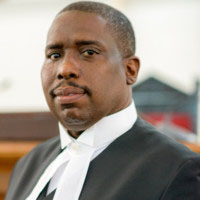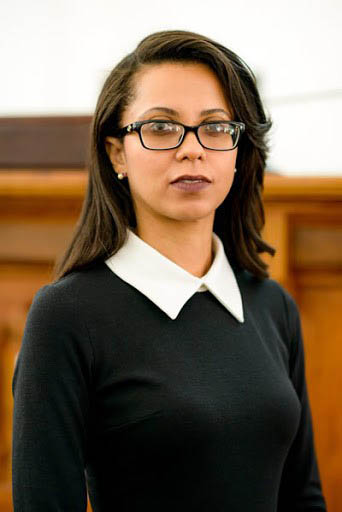Noting that there is sometimes need for attorneys to be in contact with their clients even after regular working hours, the Guyana Bar Association (GBA) has written to the National COVID-19 Task Force (NCTF) requesting that attorneys be classified as essential workers.
The call from the GBA comes against the background of the 6am to 6pm national curfew currently in place as a means of limiting the movement of people in a bid to stem the spread of the deadly COVID-19 virus.
According to the measures currently put in effect by government, only essential-service workers can be out after the curfew begins. All other persons can be arrested by the police, who have enforcement powers to ensure compliance with the order.

Lawyers are not listed as essential workers.
The NCTF, in a press release issued yesterday, said that it is considering the GBA’s request.
In an interview with Stabroek News yesterday, President of the GBA attorney Teni Housty explained that in order to properly serve their clients and facilitate access to justice, lawyers cannot operate under the current curfew arrangements.
He and other attorneys with whom this newspaper spoke advanced the scenario where persons who may be detained after the curfew hours have started, would be denied their constitutional right to have their lawyer present at that moment.
He said that a lawyer who may be making his/her way down to the station or detention facility runs the risk of being pulled over by the police for breaching the curfew guidelines.
As a result, he said that it is pivotal to their work that lawyers be included in the essential-worker bracket.
He reminded, too, that failure to allow a person their counsel constitutes a constitutional breach.
The Bar Association President emphasized that persons “cannot be denied their right to counsel.”
Seeking exemption
Meanwhile, explaining the scope of the request made to the NCTF, Secretary of the GBA attorney Pauline Chase explained to Stabroek News that they were seeking exemption for lawyers while performing services such as attending police stations to advise, consult with and represent clients who are in custody, including during the curfew hours when clients may be most vulnerable.
She said, too, that there is need for attendance at Court for hearings which cannot be facilitated by way of electronic means. She said that while the online portal ZOOM works for some cases, not all cases are suitable for hearing by such means.
On this point, she explained that there are issues such as the swearing of affidavits which she said support certain applications. The lawyer said that the GBA has written the Chancellor of the Judiciary for directions in this regard as the normal course of swearing of affidavits is impracticable if not impossible in some cases.
Chase said that apart from writing the NCTF with concerns about lawyers being able to see detained clients, the GBA has also engaged the Commissioner of Police for measures to be implemented for attorneys to have access to their clients in custody.
Chase said that while there are some services offered by attorneys that can be performed remotely, there are those which cannot, hence their request to the NCTF.
She made it clear, however, that lawyers are not at this time seeking any provision which would see them returning to their offices.
Asked about the effects of the pandemic on the legal sector, Housty said it would no doubt result in delays in the hearing of cases which are currently being adjourned for as long as the lockdown will last and even beyond, given that new cases will also flood the system.
He said that this affects the judicial side, while noting that effects will also be felt in the Commercial and Deeds Registries as well.
This newspaper also spoke to attorney Sanjeev Datadin, who opined that a clear plan with clear objectives is needed by the task force as lawyers need a system that would allow for adherence to rights of citizens and access to the court system to be “immediate and as of right.”
He said that while the ZOOM platform is workable, the ideal would be to have video conferencing facilities which are “reliable and properly maintained” and which affords for speaking to clients in prison, much like those used by the Caribbean Court of Justice.
He said that no longer can attorneys visit their clients at prison and take instructions in preparation for court, but that they have now been limited to phone calls which are themselves for limited periods.
The lawyer said that much is to be desired from the government and task force, neither of which seems to have a plan which offers any sort of holistic view to properly deal with the new realities.
Datadin said that there is no need to “reinvent the wheel” and that patterns can be adopted from other jurisdictions around the region and the world at large which have put clear guidelines in place for attorneys.
He said that taking into consideration all the guidelines and precautionary measures issued by the World Health Organization, the task force/police can ensure that in facilitating lawyers’ access to their clients, such meetings can be held at places which would allow for social distancing and strict adherence to set protocols.










